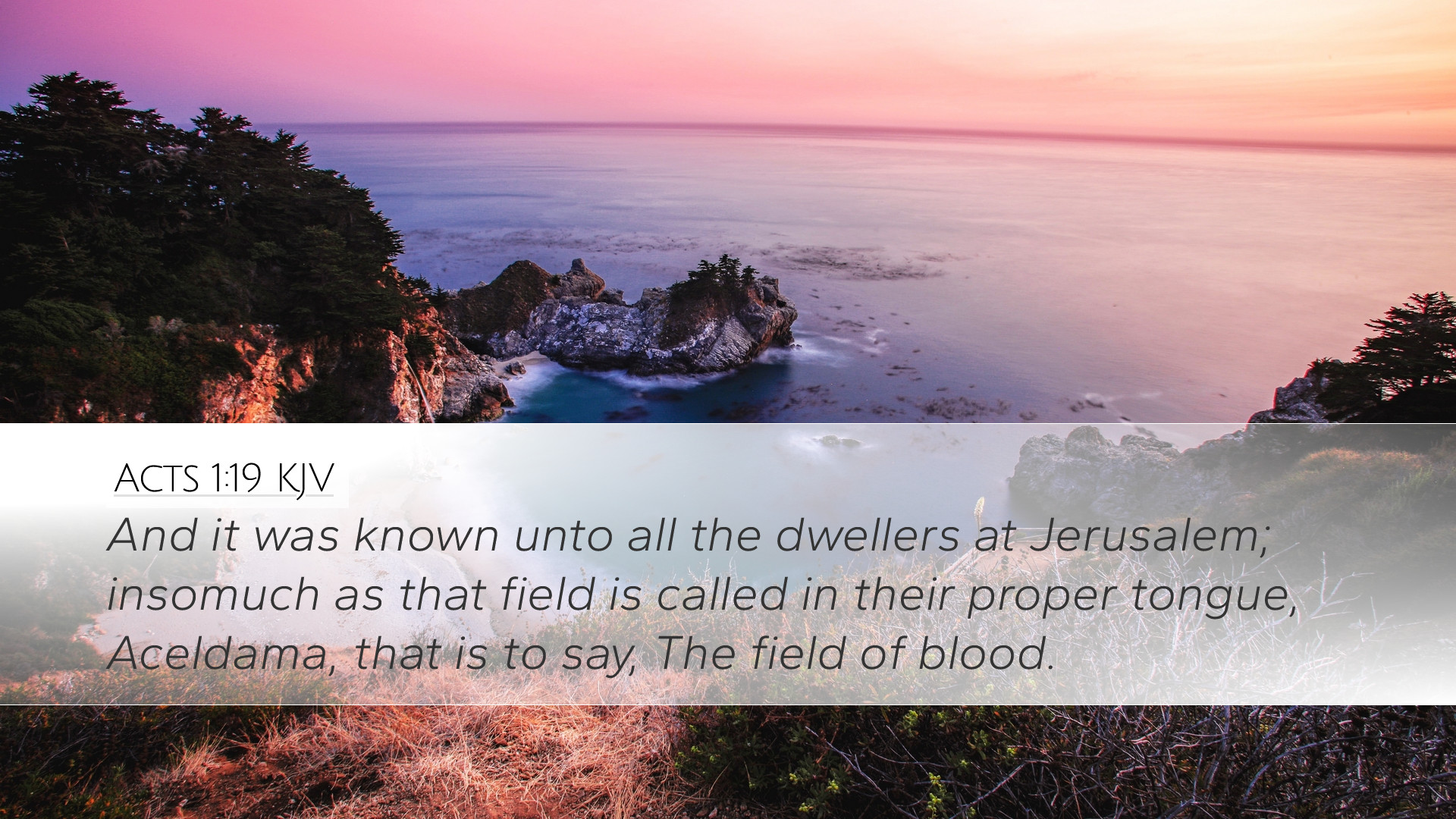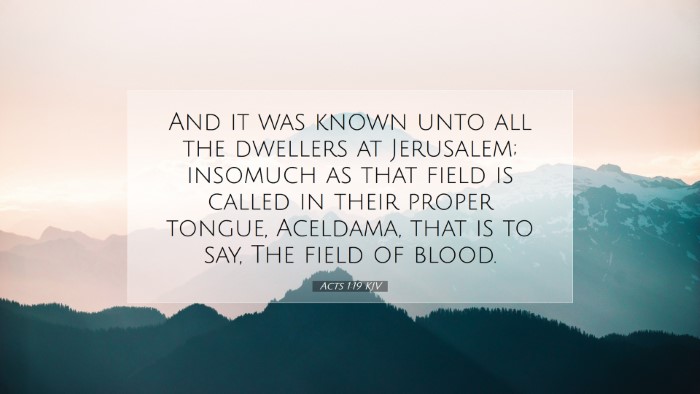Old Testament
Genesis Exodus Leviticus Numbers Deuteronomy Joshua Judges Ruth 1 Samuel 2 Samuel 1 Kings 2 Kings 1 Chronicles 2 Chronicles Ezra Nehemiah Esther Job Psalms Proverbs Ecclesiastes Song of Solomon Isaiah Jeremiah Lamentations Ezekiel Daniel Hosea Joel Amos Obadiah Jonah Micah Nahum Habakkuk Zephaniah Haggai Zechariah MalachiActs 1:19
Acts 1:19 KJV
And it was known unto all the dwellers at Jerusalem; insomuch as that field is called in their proper tongue, Aceldama, that is to say, The field of blood.
Acts 1:19 Bible Commentary
Commentary on Acts 1:19
Text of the Verse: “And it was known unto all the dwellers at Jerusalem; insomuch as that field is called in their proper tongue, Aceldama, that is to say, The field of blood.”
Introduction
Acts 1:19 captures a pivotal moment in the early Christian community following the betrayal and death of Judas Iscariot. This verse, rich with implications, serves as a reminder of divine justice, the fulfillment of prophecy, and the transformation of community identity. The insights of renowned commentators like Matthew Henry, Albert Barnes, and Adam Clarke help unpack the theological significance and historical context of this event.
Historical Context
The context of Acts 1 is crucial as it takes place after Christ’s ascension and prior to the day of Pentecost. The apostles are in Jerusalem, awaiting the Holy Spirit while grappling with the implications of Judas’s betrayal. The mention of Aceldama, or the Field of Blood, symbolizes both the fate of Judas and the implications of sin and judgment as viewed from a New Testament perspective.
Aceldama: The Field of Blood
Matthew Henry notes that the term "Aceldama" derives from the Hebrew words for ‘field’ and ‘blood,’ emphasizing its significance as a site of Judas’s treachery. This piece of land became a grave marker for the consequences of betrayal and the blood price paid for it.
Local Recognition
The verse emphasizes that this event was well-known among the residents of Jerusalem. Albert Barnes points out that the notoriety of Aceldama serves as a testimony to the serious outcome of Judas's actions. The association of the field with blood reflects not only the literal shedding of blood but metaphorically represents spiritual death as well.
Theological Themes
Divine Justice
A prominent theme in this passage is the concept of divine justice. Adam Clarke notes that the tragic end of Judas was the fulfillment of Scripture and a warning to all who would embrace treachery or sin. The field becomes a symbolic representation of the end result of sin, reminding believers of the severe consequences that accompany betrayal against God and His covenant.
Fulfillment of Prophecy
This verse connects to Old Testament prophecies regarding the fate of Judas, particularly seen in Psalms (Psalm 69:25 and Psalm 109:8). Matthew Henry emphasizes that such fulfillments should bolster believers' faith in God's sovereignty and the unfolding of His plan throughout history.
Community Identity and Reflection
The knowledge of Aceldama among the people also serves to remind the early church of their identity in light of Judas’s betrayal. Adam Clarke argues that this memory would not only denote failure but would serve as a call to unity and vigilance among the remaining apostles. This period marked a transition in community identity, as they were compelled to seek the guidance of the Holy Spirit for their next steps.
Lessons for Today
Integrity and Accountability
Acts 1:19 serves as an admonition regarding the importance of integrity among those in positions of leadership within the church. The tragic end of Judas reminds contemporary leaders that their choices have lasting implications. As Henry reinforces, the visibility of sin, as reflected in Aceldama, prompts church leaders and members alike to greater accountability to God and one another.
The Role of Memory in Faith
The recollection of Judas’s betrayal and the naming of Aceldama remind the congregation of the importance of memory in shaping faith. Recognizing the nature and consequences of sin encourages believers to reflect on their own lives and to strive for holiness, unity, and the genuine expression of faith in community.
Community Response to Betrayal
Another important lesson derived from this passage is the response to betrayal and loss. The early church's acknowledgment of Judas's actions led them to seek divine guidance in selecting a replacement apostle, emphasizing the necessity of responses characterized by prayer and supplication. Today, communities can learn from this by addressing similar issues in a spirit of restoration and with a focus on God’s direction.
Conclusion
Acts 1:19 encapsulates significant themes surrounding betrayal, justice, and community that are foundational for the understanding of early Christian identity. Through the commentaries of Matthew Henry, Albert Barnes, and Adam Clarke, we glean insights into the implications of Judas’s actions and the ensuing consequences on the Jerusalem community. This passage demands reflection on the nature of sin and encourages believers to remember the lessons learned from the past, thereby ensuring a future centered on faith and obedience.


